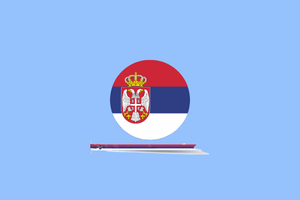Studying in Serbia from Nepal
Serbia, a Southeast European country, is known for its rich history, vibrant culture, and diverse landscapes. The official language is Serbian, and its capital city is Belgrade, one of the oldest cities in Europe. Serbia has a population of around 7 million people. It shares borders with Hungary to the north, Romania to the northeast, Bulgaria to the southeast, North Macedonia to the south, Croatia and Bosnia and Herzegovina to the west, and Montenegro to the southwest. Serbia has a growing economy with a per capita income of approximately $7,500 USD.
Top Universities in Serbia
1. University of Belgrade The largest and oldest university in Serbia, founded in 1808, it ranks highly in Eastern Europe. It offers a wide range of undergraduate and postgraduate programs.
2. University of Novi Sad: Known for its research and development, this university is located in the second-largest city in Serbia. It has a strong focus on science and engineering.
3. University of Niš: This university is renowned for its medical and technical faculties. It also offers diverse programs in humanities and social sciences.
4. University of Kragujevac: Located in central Serbia, it is known for its automotive engineering programs and collaboration with the industry.
5. Singidunum University: A private university in Belgrade, offering modern curricula in business, economics, and IT.
Visa Application Process
To study in Serbia, Nepalese students need a student visa. The process involves several steps:
1. Admission to a Serbian University: Secure an admission letter from a recognized Serbian university.
2. Visa Application: Submit the visa application form, which can be found on the Serbian Ministry of Foreign Affairs website.
3. Required Documents: Include a valid passport, recent photographs, proof of admission, proof of financial means, health insurance, and a police clearance certificate.
4. Application Submission: Submit the application to the nearest Serbian embassy or consulate. As Serbia does not have an embassy in Nepal, Nepalese students may need to apply through the Serbian embassy in India.
Student Visa Application Fee
The student visa application fee varies but generally ranges from 60 to 100 EUR, depending on the country and the specific circumstances of the applicant.
Popularity Among Nepalese Students
Serbia is becoming increasingly popular among Nepalese students due to its affordable education, multicultural environment, and European living experience. The quality of education, particularly in medicine, engineering, and IT, is highly regarded. The relatively low cost of living and tuition fees, compared to other European countries, also makes Serbia an attractive destination.
Post-Study Work Visa Opportunities
After completing their studies, students can apply for a temporary residence permit for job searching or employment. This permit can last up to one year, allowing graduates to find a job related to their field of study. Once employed, graduates can transition to a work permit, which could eventually lead to permanent residency.
Popular Fields of Study in Serbia
Some popular fields of study for international students in Serbia include:
- Medicine and Health Sciences
- Engineering and Technology
- Business and Economics
- Information Technology
- Social Sciences and Humanities
Average Living Cost in Major Serbian Cities
1. Belgrade: The capital city has the highest cost of living, with monthly expenses (including rent) averaging around 500-800 EUR.
2. Novi Sad: Slightly cheaper than Belgrade, the average monthly cost is around 400-700 EUR.
3. Niš: One of the more affordable cities, with costs ranging from 300-600 EUR per month.
4. Kragujevac: The cost of living here is also lower, around 300-500 EUR monthly.
5. Subotica: Another affordable city with average monthly expenses of 300-500 EUR.
Dependent Policies
Students can bring their dependents (spouse and children) to Serbia, but they must apply for a dependent visa. Dependents must provide evidence of family ties, proof of sufficient funds, and health insurance. The application process is similar to the student visa application.
Permanent Residency (PR) and Citizenship
International students can apply for permanent residency after five years of continuous stay in Serbia. This stay can include the period of study and work. For citizenship, an individual must reside in Serbia for at least three additional years after obtaining permanent residency, show knowledge of the Serbian language, and have no criminal record.
GAP Acceptance
Serbian universities are generally flexible regarding educational gaps. They consider the reason for the gap and the applicant’s overall academic record. This applies to both bachelor’s and master’s degree programs.
Advantages of Studying in Serbia for Nepalese Students
- Quality Education: Serbian universities offer high-quality education, particularly in fields like medicine and engineering.
- Affordable Cost: The cost of living and tuition fees in Serbia are lower compared to Western Europe, making it an economical option for international students.
- Cultural Experience: Serbia’s rich cultural heritage and diverse environment provide a unique experience for students.
- Pathway to Europe: Studying in Serbia provides a gateway to explore Europe, as it is well-connected with the rest of the continent.
- Post-Study Opportunities: There are ample opportunities for students to work and settle in Serbia after their studies.
Diplomatic Relations and International Affiliations
As of now, Serbia does not have an embassy in Nepal, nor does Nepal have an embassy in Serbia. Nepalese students can contact the Serbian embassy in India for visa and consular services. Serbia is not a member of the European Union (EU), Schengen Area, or NATO. However, it is a candidate country for EU membership and has signed agreements with various international organizations.
In conclusion, Serbia offers Nepalese students an excellent opportunity for higher education. With quality universities, affordable living costs, and a welcoming environment, Serbia is an attractive destination for those looking to study abroad. The country’s strategic location in Europe and the possibility of gaining post-study work experience further enhance its appeal.

